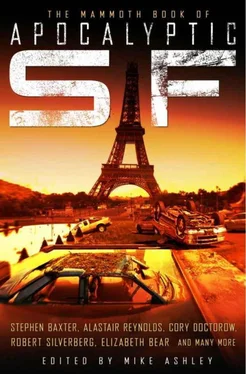“I told you,” Tanya scolded him. “Don’t do that.”
“Specimens.” He shrugged. “You ought to take a look.”
He stayed on guard with the gun while I went on with her to study his kills. No larger than a dog, the infant hopper was hairless, covered with fine grey scales, its belly torn open and entrails exposed. Tanya spread the mangled body on the grass for my camera.
“It’s well shaped for its apparent ecological niche, but that’s about all I can say.” She shook her head in frustration. “We must have had a hundred million years of change.”
The killer was a compact mass of powerful muscle, clad in sleek black fur. She opened its bloody jaws to show the fangs to my camera, had me move the body to show the teats and claws.
“A mammal.” She spoke for the microphone. “Descended perhaps from rats or mice that somehow got through alive.”
Still aglow with the elation of discovery, she forgave Arne for his kill.
“A new world for a new race!” she exulted.
“Maybe,” Arne muttered. “But ours? More likely a brand new biology, where we’ll never belong.”
“We’ll see.” She shrugged and looked around again at the sea where the great amphibians lived and the jungle that had bred the killer. “We’re here to see.”
She set the robot to scraping soil from the top of a rocky knob to level a site for our lab and living quarters. We unloaded supplies and set up the first geodesic dome. The robot began cutting stone for a defensive wall. She took me on short expeditions along the shore and up the ridge to record the flora and fauna we found. She was soon asking Pepe about fuel for the plane.
“The reserve still aboard might get us back to the Moon, with half a drop left in the tanks.”
“With only one aboard?”
“Safe enough.”
Then I want you to go back for what we need to replant our own biocosm. Seed, frozen eggs and embryos, equipment for the lab.”
“To replant ourselves?” Arne scowled at her. “With that black biocosm just over the ridge?”
She shrugged. “We face risks. We must cope when we can. Leave our records when we can’t.” She turned to me. “You’ll go back with Pepe. Holograph the data we can send you. Hold the fort.”
“And leave us marooned?” Arne went pale. “Just the two of us?”
“Pepe will be back,” she told him. “You have enough to do here. Testing soils. Prospecting for oil and ores we’ll need.”
Pepe and I went back to the Moon. My beagle was happy to have me home. The robots loaded and refueled the plane. Pepe took off and left me alone and very lonely. The robots were poor companions and the holos had nothing new to say, but Spaceman was a comfort until I got news from Earth.
Pepe had inflated another geodome for a hydroponic garden. Arne surveyed land for a farm. When the rainy season ended, the robotic Calvin built a diversion dam to draw irrigation water from the river.
“Arne enjoys shooting a yearling jumper when we need meat,” Tanya reported. “A tasty change from the irradiated stuff we brought from the Moon. The hippo-whales come and go between the river and the grass. They stopped twice to stare and bellow, but they ignore us now. I think our tiny human island really is secure, though Arne still frets about the black spot. He’s gone now to climb the western cliffs for a look beyond the rim.”
Her next transmission came only hours later.
“Arne’s back.” Her voice was tight and quick. “Exhausted and in panic. Something chased him. A storm, he calls it, but nothing we can understand. A cloud so dark it hides the sun. A roar that isn’t wind. Something falling that isn’t rain. He says our days on Earth are done.”
The monitor went blank. All I heard was static. Outside the dome Earth hung full in the lunar night. I watched Africa slide out of sight, watched the black-patched Americas crawl through an endless day, watched Africa return, heard Tanya’s voice.
“We’re desperate.”
Her face was drawn haggard and streaked with something black. In the window beyond her head, I saw a dead black slope reaching up to the dark laval flows that edged the rift valley.
“The bugs have overwhelmed us.” Her voice was hoarse and hurried. “Bugs! They’re what made those blighted areas that always worried Arne. You must preserve the few facts we’ve learned.
“These marauding insects have evolved, I imagine, from mutations that enabled some locust or cicada to survive the impact. Evidently they now enter migratory phases like the old locusts. A strange life cycle, as I understand it. I believe they’re periodic, like the seventeen-year cicada.
“They must spend decades or even centuries underground, feeding on plant roots or juices. Emergence may be triggered when they’ve killed too many of their hosts. Emerging, they’re voracious, consuming everything organic they reach and then migrating to fresh territory to leave their eggs and begin another cycle.
“Their onslaught on us was dreadful. They blackened the sky. Their roar became deafening. Falling like hail, they ate anything that had ever been alive. Trees, brush, grass, live wood and dead wood, live animals and dead. They coupled in their excrement, buried their eggs in it, died. Their bodies made a carpet of dark rot. The odor was unendurable.
“We’re safe in the plane, at least for now, but total desolation surrounds us. The bugs ate our plastic geodomes. They ate the forest and the grass. They killed and ate the hoppers, bones and all. They shed and ate their wings. They died and ate the dead. They’re all gone now. Nothing alive but their eggs in the dust, waiting for wind and water to bring new seed from anywhere to let the land revive, while they hatch and multiply and wait to kill again.
“Dark dust rises when the wind blows now, bitter with the stink of death. The hippos came out, wandered forlornly in search of anything to graze, and dived back in the river. Nothing alive is left in sight. Nothing but ourselves, in a stillness as terrible as their roar.
“How long we can last, I don’t know. Arne wanted to give up and get back to the Moon, but there’s no fuel for that. We aren’t equipped for any long trek across this devastation, but Pepe has ripped metal off the plane and welded it into a makeshift boat. If the bugs didn’t get across the sea, perhaps we can make a new start beyond it.
“The plane must be abandoned, with our radio gear. This will be our last transmission. Keep your eye on the Earth and record what you can.
“And Dunk-” With a catch in her voice, she stopped to wipe at a tear. “I couldn’t wish you were with us, but I want you to know I miss you. Next time, whenever that comes, I hope to know you better. As Pepe likes to say, Hasta la vista!”
One thousand years after, we’ve been reborn to try again. Much of Earth is still darkly scarred, but those dark spots are gone from Africa and Europe. We’re going down to Earth, all five of us, with a cryostat filled with seed and cells to replant the planet if we must. Dian is bringing a few of her precious artefacts and the narrow chance we find anybody apt to care.
We’re landing on the delta of the Nile. It drains into the Red Sea now, but its valley is still a vivid green slash across red-brown desert. Pepe has picked a landing spot a little north of where the pyramids stood. We’re overloaded. Pepe thinks we’ll have to spend so much fuel on survey and landing that we can’t come back, but we’re prepared to stay. I’ll record more detail as we drop out of low orbit.
“Technology!” Pepe’s shout of triumph rang from the cockpit on our first pass above the Nile. “They’ve got technology. I heard radio squeals and whistles, and then a burst or weird music. I think our job is done.”
Читать дальше












